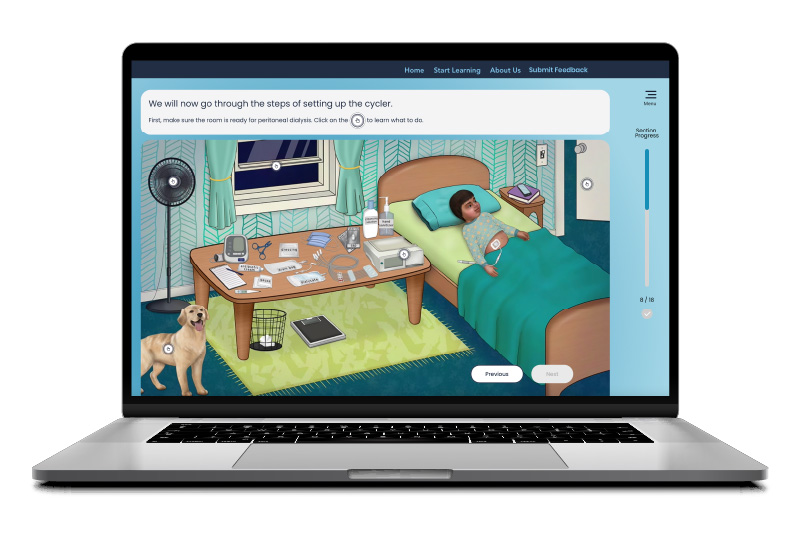New online peritoneal dialysis simulator gives the power of education to patients

For years, patients who need peritoneal dialysis, a form of home-based treatment for kidney disease, have had to educate themselves about the approach. “Many families have never heard of peritoneal dialysis prior to their child’s diagnosis,” shares Dr. Deborah Stein, a nephrologist in the Division of Nephrology at Boston Children’s Hospital.
The idea of peritoneal dialysis appeals to many families. “Patients are able to have their treatment done at home, which decreases hospital visits and provides a sense of comfort and accessibility to the family,” says Stein. “However, parents still need to complete extensive training with a dialysis nurse to learn exactly what is needed to safely do this at home, which is usually what causes families to hesitate.”
For example, parents must not only understand how the kidneys function, but also learn how to physically set up the peritoneal dialysis machine and make their home safe to perform this treatment. “This is very complex, there are a lot of steps to follow to do this treatment correctly, and that alone can be overwhelming for parents,” explains Dr. Kaitlyn Order, a clinical fellow in the Division of Nephrology.
To provide a visual and interactive training tool for families considering peritoneal dialysis, Stein and Order drew on the power of simulation. The training tool that the pair created is part of a larger collaboration with OPENPediatrics, an open-access online community where health care professionals share resources and digital learning tools to better improve patient care and education.
“Using this simulator, medical professionals and patient families will have access to detailed, visual training videos and modules that offer a hands-on approach to learning about peritoneal dialysis,” shares Order.
Accessible dialysis education without restrictions
Parents currently learn how to perform peritoneal dialysis during a series of in-person practice sessions at Boston Children’s that span several weeks. When they go home, they must be able to replicate everything they learned in the hospital. “We wanted to provide another learning resource to help families process that information and feel confident when performing this treatment at home, without the nurses around,” says Order.
The free online training tool is available for parents and patients alike to use anytime. The simulator includes a combination of educational video clips that provide background on peritoneal dialysis and interactive “clickable” activities that walk users through all the steps in the dialysis process. Working with their colleagues in OPENPediatrics, Order and Stein helped visualize interactive models depicting everything from the dialysis machine that parents will use to a step-by-step practice of gathering the proper supplies needed to get your child ready for treatment.
“Whether it’s clicking through steps to prepare a virtual bedroom, watching a video to learn the steps of the dialysis cycle, or identifying the different parts of the human body, users have information available right at home,” explains Order. Families can restart, revisit, and keep learning each step of the dialysis process at their own pace through the training tool.
Shaping the future of online resources
If parents or patients encounter any hurdles at home during this treatment, they can refer to the resource before calling their care team — and feel more empowered to reach out when they do face a challenge. The training tool’s video portions are housed on the OPENPediatrics YouTube channel, and patient families and medical professionals can access the tool through a simple Google search.
Stein’s hope is that “families will be able to feel more in control of their care after using the simulator to ask detailed questions to their care team and have a better understanding on the complex concepts involved in peritoneal dialysis.”
For more information, visit the Division of Nephrology or try out the simulator here.
Related Posts :
-

If your baby or toddler needs peritoneal dialysis: Tips for parents
Marybeth Bentson and Theresa Pak have helped a lot of families cope with childhood kidney disease. As long-time nurses in ...
-

A master regulator of kidney health?
End-stage kidney disease often begins with injury to podocytes. These highly specialized cells are a critical part of the glomeruli, ...
-

From Virginia to Boston for a kidney transplant: Joshy’s story
Joshy Buchheit is a lot like most 4-year-old boys. He loves playing in the mud, riding his scooter, and keeping ...
-

A surgeon’s last-minute trip to Sri Lanka reduces children’s wait for needed heart repair
Last year, Dr. Christopher Baird got an offer he couldn’t refuse — something that happens often as he travels the ...





